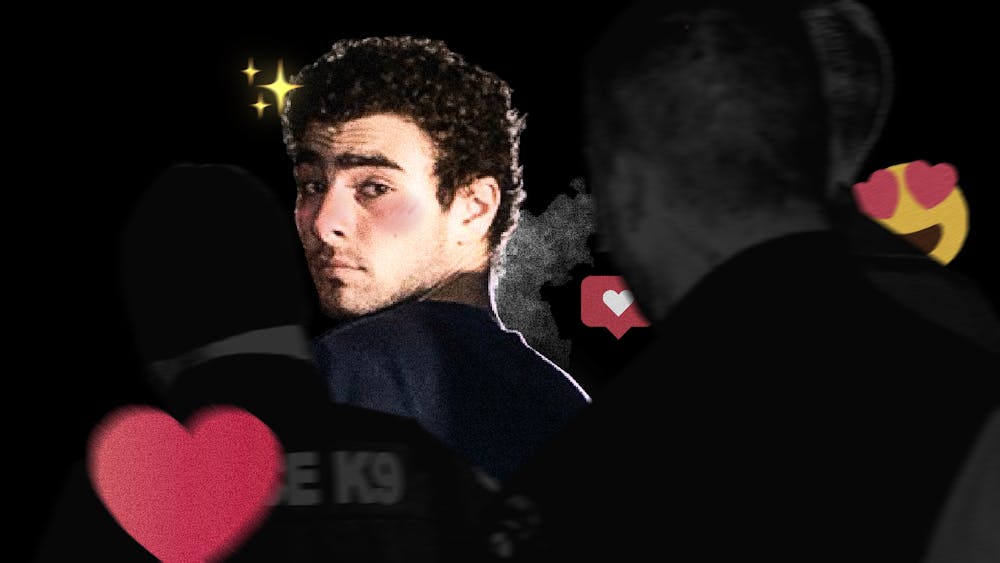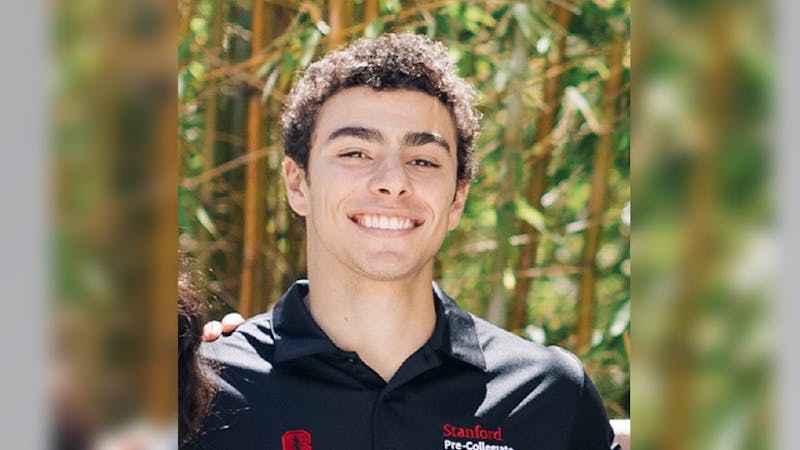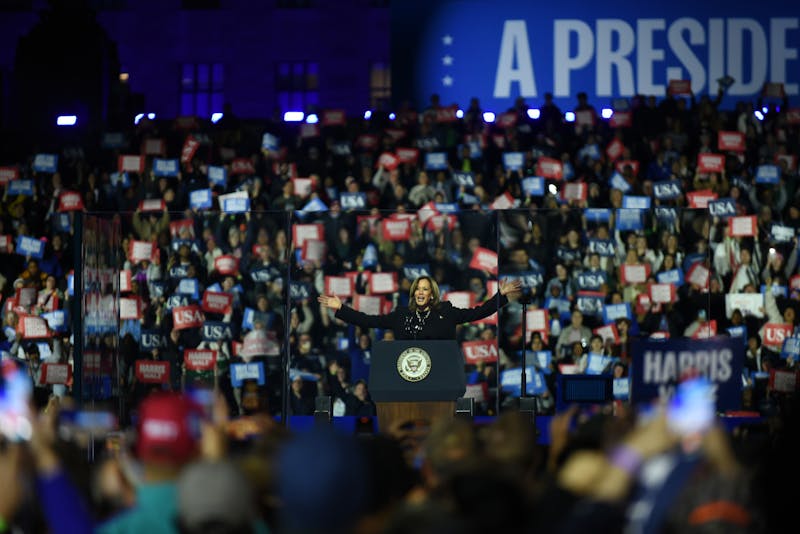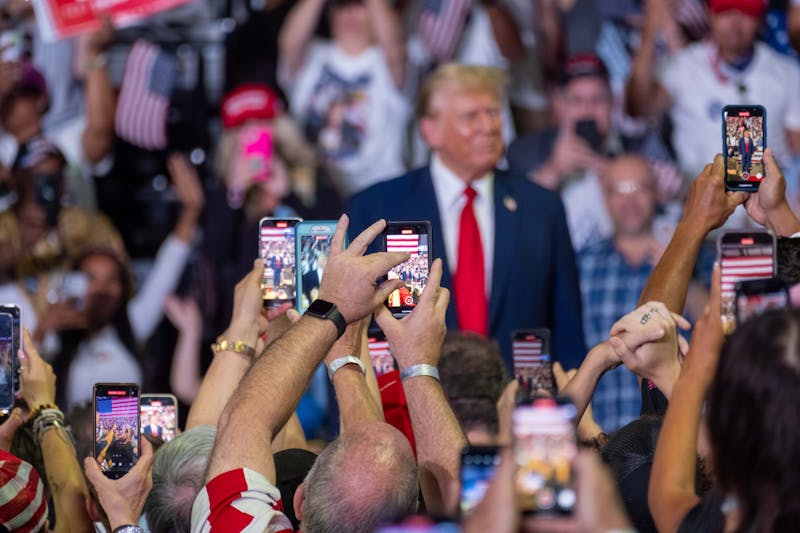
Piper: Glad to be back on campus, Tiyya! I remember the last week of classes like it was yesterday.
Tiyya: Same here, Piper! Speaking of last semester, I can’t forget the frenzy around the murder charges against 2020 Engineering graduate Luigi Mangione.
Piper: Right? Even though I left campus, the buzz around his case followed me through news outlets, social media, and even to Christmas dinner.
Tiyya: What I find most interesting is the subject of discourse over the media. As polarizing as Mangione is, the majority of the conversation seemed to revolve around his appearance instead of the crime.
Piper: You’re right. Even before the public knew the identity of the alleged UnitedHealthcare CEO assassin, people flooded social media, calling the masked suspect “hot.” Mangione’s looks have been a driving factor in the fascination with his case. When his identity was revealed — young, attractive, wealthy, private school valedictorian — the public’s obsession only grew. Photos of Mangione ranging from business occasions to shirtless hiking shots multiplied on social media, with many soon bestowing him the title of “hot assassin.” Users took to X, the platform formerly known as Twitter, sharing, “If the guy is fit, you must acquit,” and “He’s even hotter with his mask and shirt off.” I’m not denying Mangione’s good looks, but I was surprised to see the overwhelming focus on an alleged murderer’s shirtless photos.
Tiyya: Perhaps this phenomenon isn’t that surprising. America does love a criminal with a nice face, which is prevailing evidence of the halo effect. This is another form of stereotype bias: When people are more attractive, we tend to put a “halo” around them and their actions, making it easier for them to get hired, make friends, or even be forgiven for violent crimes. Ted Bundy, an infamous serial killer with 30 confirmed murders, has a fan following devoted to his charisma and good looks. With TikTok and Netflix documentaries paving the way for an amplified halo effect around Bundy, it’s not so surprising that Mangione’s fan following escalated beyond Sidechat posts and into the broader public sphere.
Piper: Exactly, Tiyya. Mangione’s groupies are merely following the same path that history has paved. Of course, handsome criminals most likely had admirers, but when did it become acceptable to voice that? I believe part of the answer lies in modern media’s sensationalization of crime. In the era of glittering documentaries, TikTok edits, and true-crime podcasts, people have turned into sleuths and admirers from their couches. Both Bundy and the Menendez brothers are subjects of Netflix’s recent high-budget documentaries starring attractive and famous actors. Many fell in love with Netflix’s picture of the infamous brothers gallivanting around shirtless and toned. It was a compelling image for sure.
Tiyya: Mangione already has a multi-part documentary on Hulu. Producers know their audience, and they know what it takes to sell. They’ve witnessed the glamorization and fetishization of Mangione, and the media understands its correlation to profit.
Piper: Of course, and these consumers aren’t just in love with the actors, but with the actual criminals they’re portraying. Viral TikTok edits showed transitions between clips from the Menendez brothers’ Netflix documentary to clips of the actual brothers in their criminal trial. There’s an entire genre and aesthetic dedicated to romance with the incarcerated. Britney Spears said it herself: “Mama, I’m in love with a criminal.” Pinterest has boards dedicated to the “mob wife aesthetic,” where women dress up in fur coats and paint on bruises. How chic. Recognizing when criminals are attractive isn’t the problem, but when an entire comment section, X poll, or Reddit thread is idolizing them, it sets a standard that a sense of mercy can be granted to these criminals based on their looks.
Tiyya: But does the public’s perception of a criminal really matter? We have the rule of law and the courts decide the final verdict, but despite what the jury in the courts decides, the jury of his peers may have a verdict that speaks more to society as a whole than the legal ramifications of his crime. It is important to distinguish Mangione’s unique position as a Robin Hood-like figure from his deliberate and planned crime, complete with bullet casings engraved with “delay,” “deny,” and “depose,” which symbolized a grievance against the corruption of insurance companies. Mangione’s “halo” is reinforced by the savior role he embodies for many Americans impacted by the health system. For the most part, his crime was condemned but his motivations were not, and this leaves a loophole for other criminals to escape public condemnation of other serious crimes.
Piper: Exactly, the public’s perception of a criminal absolutely matters. Look at the viral case of Karen Read that exploded all over social media and translated into nationwide protest. Her proceedings resulted in a mistrial due to a deadlocked jury, which is seen to be the result of the non-sequestered jury’s access to the outside world and media surrounding the case. The public saw Read as innocent, which influenced the trial itself. To examine just why public opinion is powerful, we must look at the commonality between the accused. Bundy, the Menendez brothers, and most recently, Mangione, are all attractive, wealthy, and white. Public fascination with high-profile defendants stems from disbelief: How could such attractive and wealthy individuals commit such atrocities? How could Mangione, the brilliant Gilman School valedictorian and Ivy League graduate, plan and carry out a murder? This narrative essentially wraps individuals that fit America’s image of privilege in a protective bubble that makes holding them accountable more difficult. This bias not only affects public opinion but also perpetuates systemic inequalities. The same grace is rarely granted to those from marginalized backgrounds.
Tiyya: Agreed, Piper. It’s not like Mangione is the first criminal whose privileged identity allows for grand displays of baseless forgiveness. Bonnie and Clyde’s 1930s crime spree, which included multiple murders, are often somehow justified under the realm of them being a good-looking couple. The Menendez brothers, victims of a serious crime and years of abuse, have their stories glossed over in favor of their “bad boy” image. This leads us to miss the point. Mangione, while having taken the extreme route, was attempting to make a statement about our failing healthcare system. When the public’s knee-jerk reaction is to make choppy edits to the tune of Britney Spears’ “Criminal,” we are playing into the American tendency to look past problems to uphold an aesthetic. Yes, our criminal justice system is broken. Yes, our healthcare system is broken. But does our moral compass need to be blinded by the American need to be attractive, even in moments of violence?
Piper: The fixation on appearance hides the real issues at play. Mangione’s alleged actions, as extreme as they may have been, should evoke conversation dedicated to improving our clearly broken healthcare system. Yet, the narrative is diluted by fascination with his looks and persona. It's easier for people to romanticize crime rather than spend time examining the truth behind how privilege and inequality further provoke violence. Systemic reform becomes an afterthought rather than the focus.
Tiyya: You’re right. And not only does this innate sense of forgiveness of the privileged and attractive apply to criminals, but it also extends to campus culture. Mangione did go here, after all. With a school whose priorities tend to be a hyperfixation on the potential LinkedIn post that a round of volunteering could bring, it’s no surprise that we jumped on the chance to gloss over the motive and action of Mangione’s crime and instead claim a twisted sense of pride over his newfound fame. As his message remains unheard or purposely ignored at his alma mater, I wonder if this moment is a true reflection of Penn students’ values underneath the flashy surface.
Piper: The public’s fixation on Mangione’s looks demonstrates a clear need for societal change. We must start prioritizing substance over appearance. We must hold everyone accountable for the crimes they commit. As Penn students, we have a unique responsibility to use our education and platform to challenge norms associated with privilege and power. Rather than perpetuating a culture that values image over accountability, we must strive for integrity.
Tiyya: Right, Piper. After all, for every outlaw there is a victim, and as much as we romanticize these crimes, real people suffer the consequences.
TIYYA GEIGER is a College first year studying political science from Lancaster, Pa. Her email address is tiyyag@sas.upenn.edu.
PIPER SLINKA-PETKA is a College first year studying health and societies from West Virginia. Her email address is pipersp@sas.upenn.edu.
The Daily Pennsylvanian is an independent, student-run newspaper. Please consider making a donation to support the coverage that shapes the University. Your generosity ensures a future of strong journalism at Penn.
Donate








